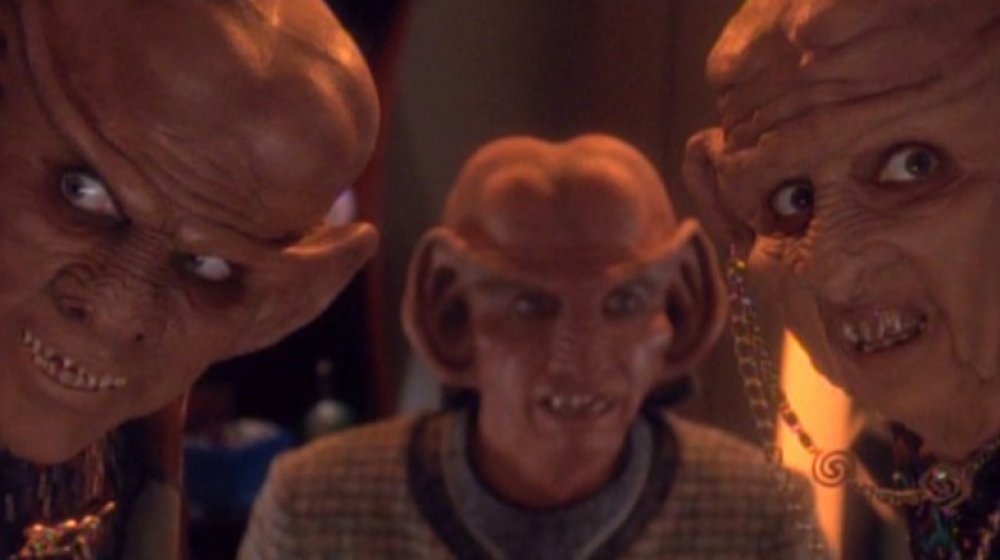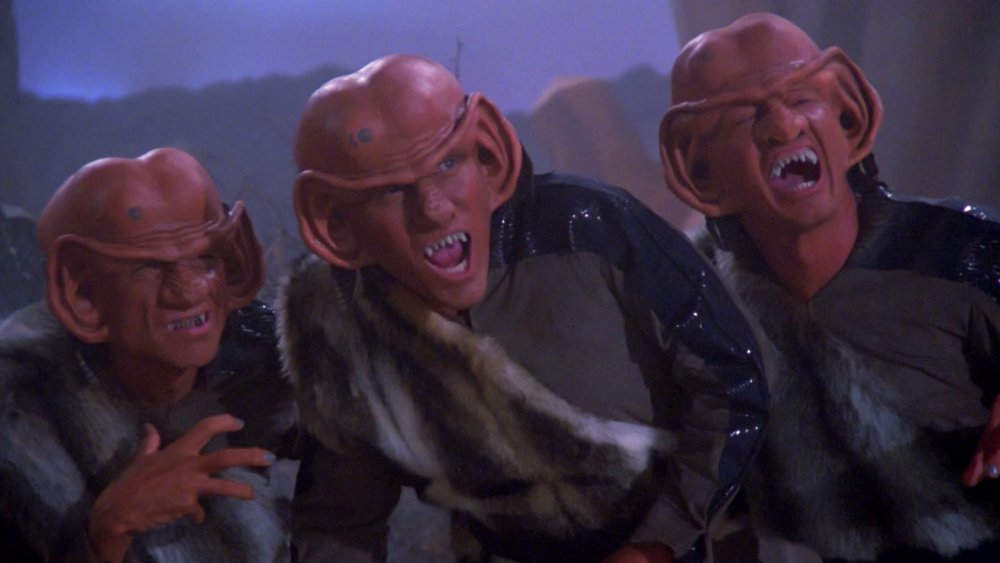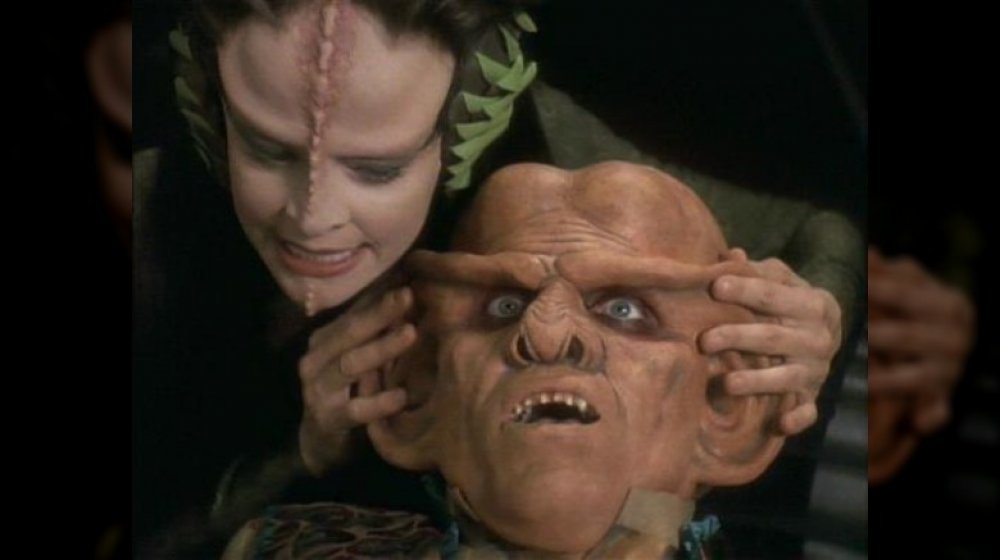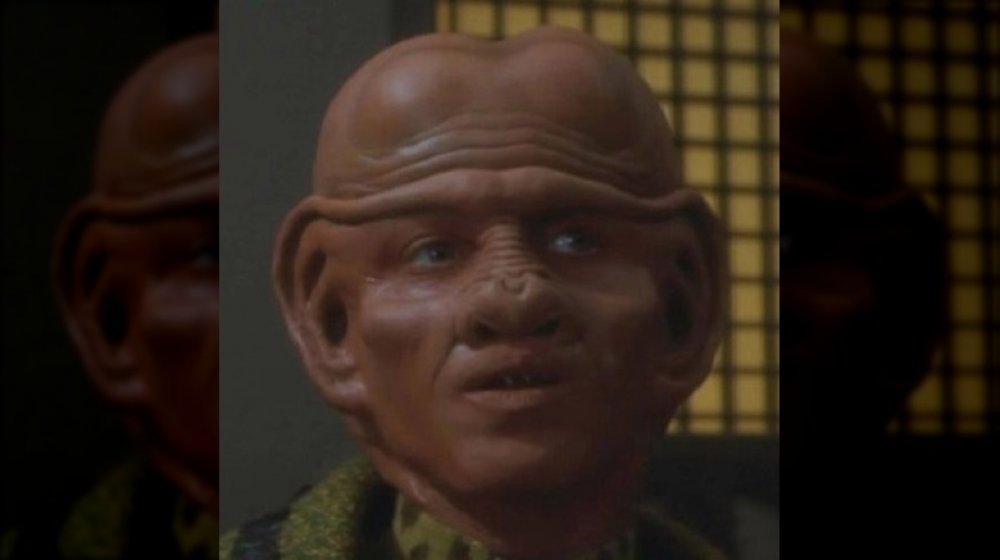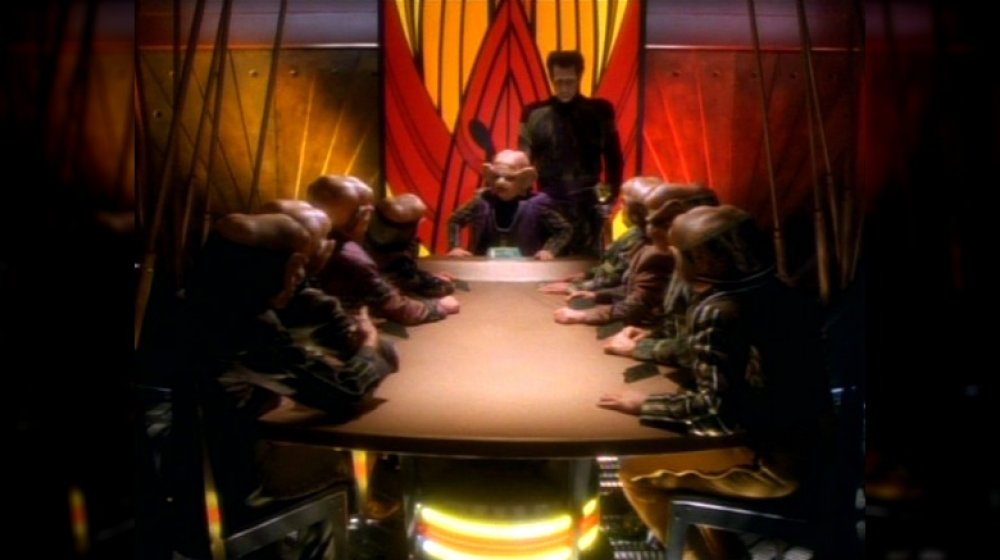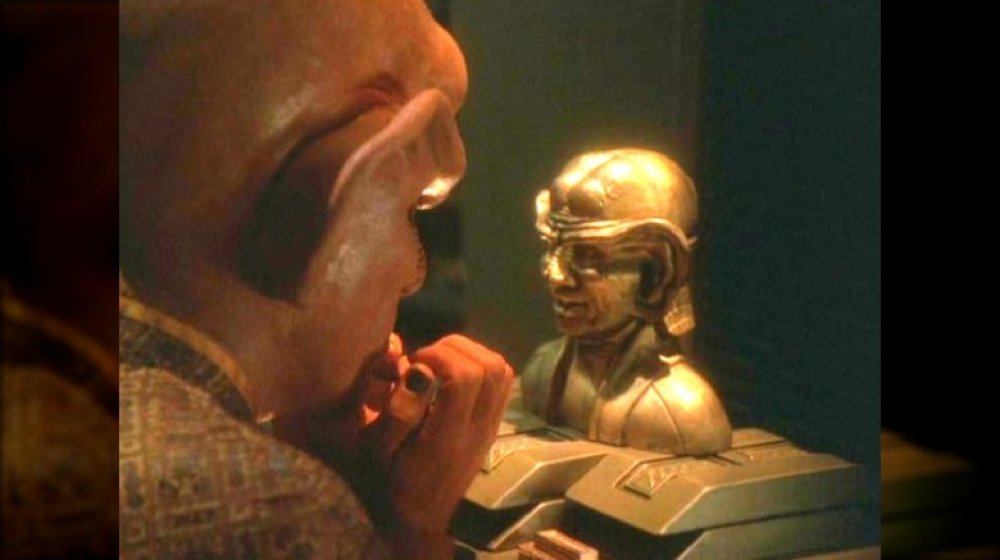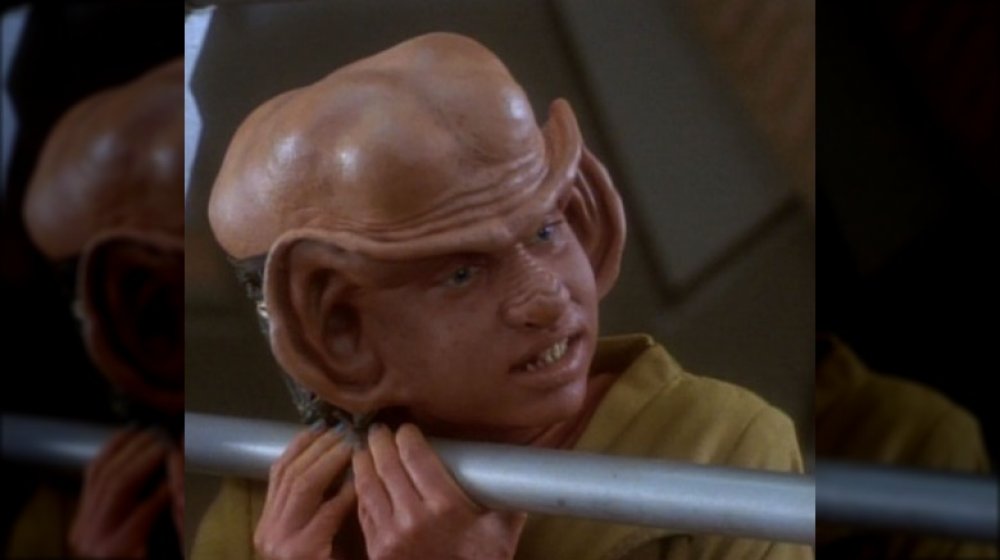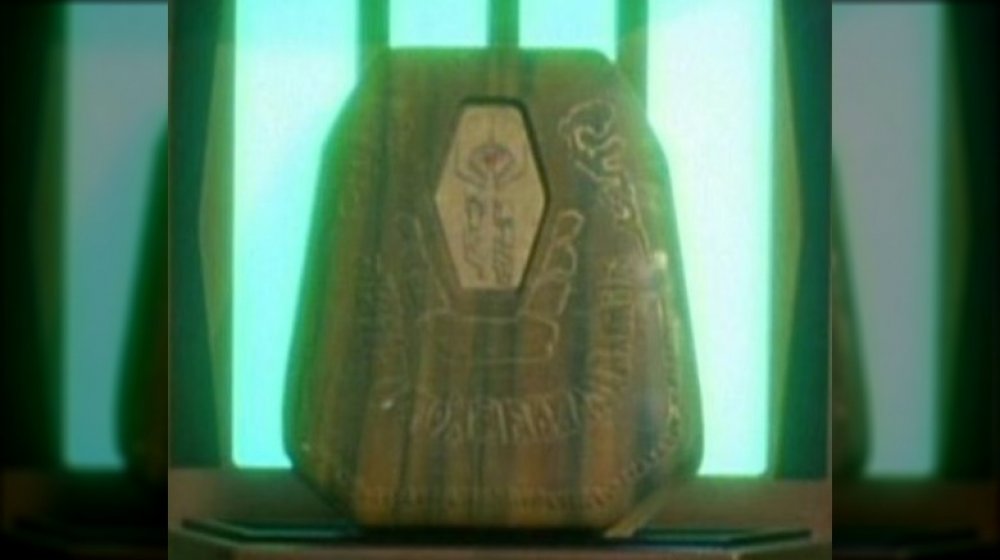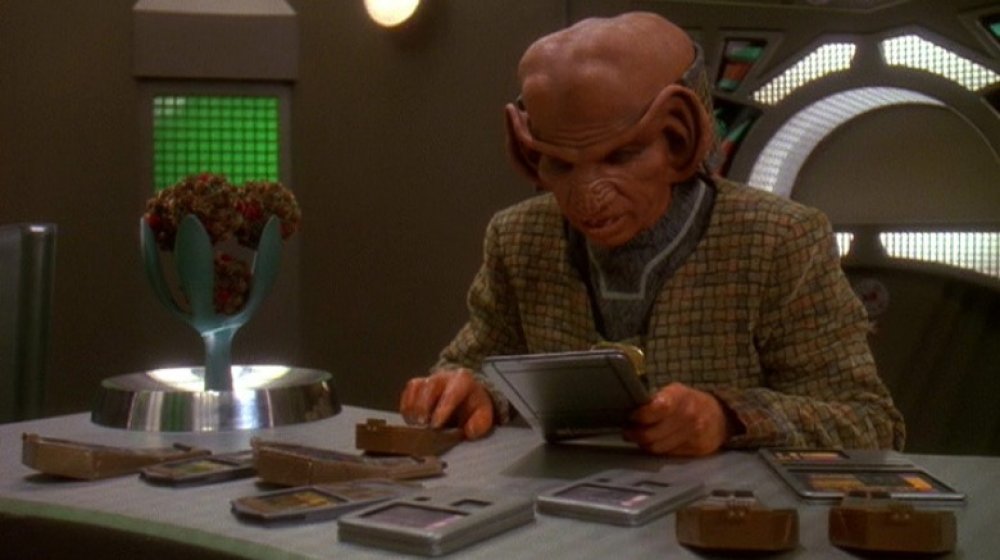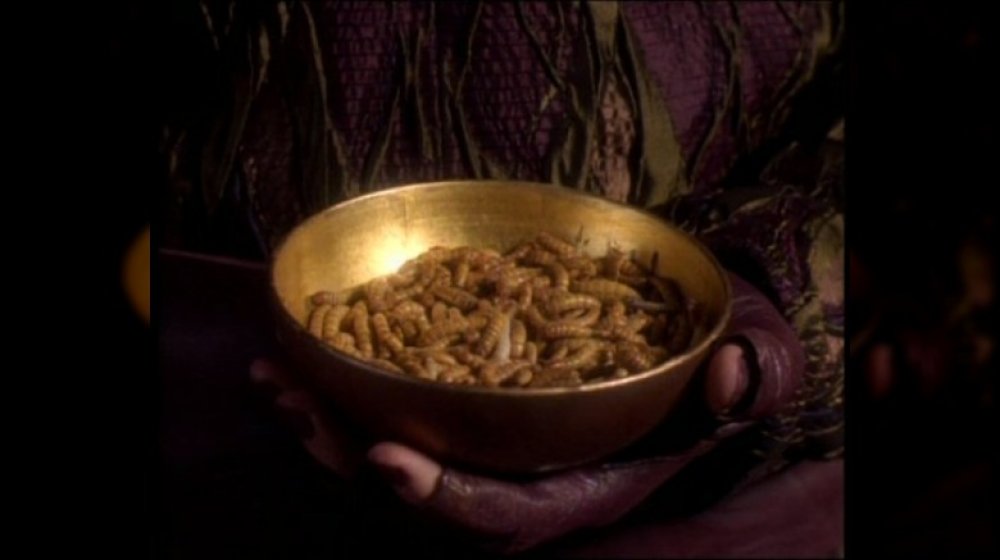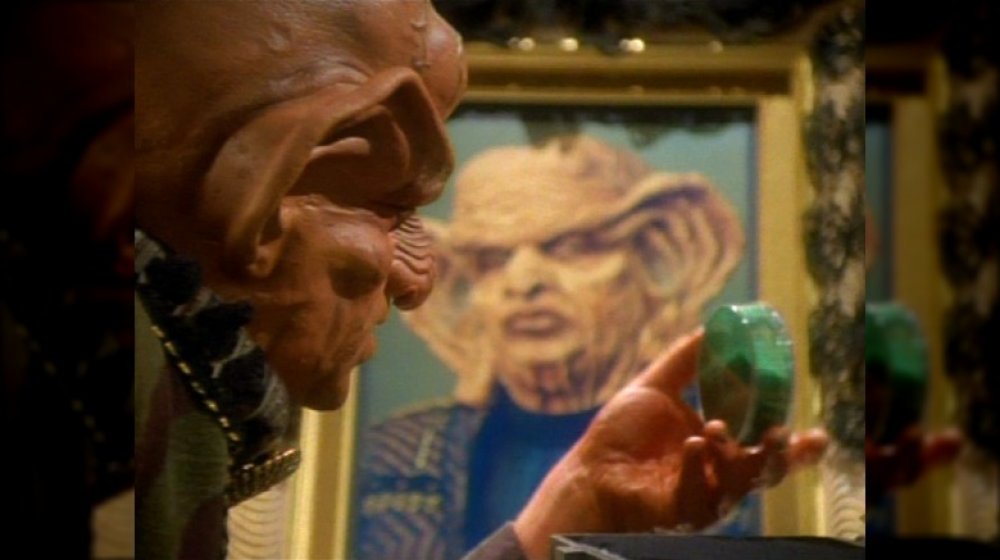Messed Up Things About The Ferengi In Star Trek
Starfleet boldly goes where no one has gone before, but the Ferengi boldly sell what no one has sold before. Short in stature and big on commerce, these pointy-toothed, big-eared aliens look like the stuff of nightmares, but they'd rather take your latinum than your life. The Ferengi pursue profit above all else, and swindling or even piracy are par for the course. Notably neutral when it comes to major galactic conflicts, they'll do business with any willing power — the Romulans, the Cardassians, the Dominion, and more. After all, scruples are for humans.
That's the popular image of the Ferengi, but they're much more than cut-rate comic relief villains to be trotted out when the writers are out of ideas. Take a closer look, and you'll see a rich culture, steeped in history and tradition. So what if it's all related to money? The stars are made of latinum, so here are some messed up things about the Ferengi in Star Trek.
The Ferengi were supposed to be TNG's main villains
When Star Trek: The Next Generation was in development, the Ferengi were meant to be the show's main antagonists, as the Klingons had been in The Original Series. As noted by Trek Movie, they were ominously referenced in TNG's premiere episode, and fans didn't have to wait long until they were introduced in "The Last Outpost." Their big reveal, however, didn't go as planned. The Ferengi were slapstick goofballs, no attempt to make them seem like a real threat afterward worked, and TNG's main villain slot was eventually filled by the Romulans and the Borg.
In 2018, Armin Shimerman, who played one of the Ferengi in their initial appearance and went on to play Quark in Deep Space Nine, revealed to Gamespot that he blamed himself for the species' introductory faceplant, stating, "'The Last Outpost' was a disaster. And no one one bears the brunt of that mistake more than I do." Despite his sense of guilt, Memory Alpha points out that people behind the camera were the ones who directed him and the other Ferengi actors to, as Shimerman put it, "jump up and down like crazed gerbils." On a related note, although the Ferengi did not come out how Gene Roddenberry intended, his idea to make them rather ... well-endowed (as indicated by massive codpieces) probably wouldn't have helped, either.
Those big Ferengi ears are erogenous zones
One of the most immediately recognizable Ferengi features are their big ears, or "lobes" as they prefer to call them. Per Memory Alpha, those ears, which are larger in males, grant the Ferengi exceptional hearing, sufficient to gauge decibel levels and even tell another's species. As noted by the Star Trek Database, bigger ears are seen as a mark of virility, which makes sense given that they're also erogenous zones. That's right, you can rev a Ferengi up by stroking his ears, and they even have a word for the act: oo-mox.
As you might expect, the Ferengi have put quite a bit of thought into oo-mox. In addition to the usual massaging, stroking, and caressing, there are a variety of techniques for the more advanced lobe-handler, as detailed in the book Oo-mox for Fun and Profit. One might try the auditory nerve nibble, the Eustachian tube rub, or the tympanic tickle (though the latter should not be performed by beginners). However they're done, oo-mox need not be relegated to the bedroom. Some Ferengi hire women to give them oo-mox anytime, anywhere, which is a sign of wealth.
Profit is everything for the Ferengi
Ferengi culture is capitalism on steroids. According to the Star Trek Database, business and pleasure are one and the same, and commerce permeates every aspect of society. The ultimate ideal is acquiring wealth, and the Ferengi idolize successful businessmen the way Klingons might revere a great warrior.
As detailed by Memory Alpha, greed is a virtue among Ferengi. Only a fool without the lobes for business would cut into his profits with silly ideas like "fair prices" and "workers' rights." Exploitation of both customers and employees is the norm, and don't expect the downtrodden to fight for change. They'd rather rise to a position where they can do the exploiting. Opportunism is a virtue as well, and nothing in Ferengi society is free. Visitors to a Ferengi's home are charged an admission fee of one slip of latinum, even sons visiting their parents.
All that greed leads to a lot of intrigue and suspicion. The Ferengi equivalent to a human handshake is two businessmen placing the backs of their hands together and then quickly pulling them away in distrust, and when one Ferengi enters another's home, it is traditional for the host to say, "My house is my house," to which the visitor replies, "As are its contents." Despite the cutthroat nature of their culture, however, a Ferengi might be quick to point out that their focus on commerce has left their history far less bloody than those of other species.
Women are nothing to the Ferengi
Ferengi society is patriarchy on steroids. Men are born into a galaxy full of latinum and opportunity, and women ... aren't. Ferengi women, often simply referred to as "females," aren't allowed to own property, to speak to males other than family members, or even leave the house without a man escorting them. They must be naked at all times, and, per the Star Trek Database, a woman wearing clothes can cause a male Ferengi to avert his eyes the way a human might in response to nudity.
By far, the most hobbling restriction Ferengi women face in their business-obsessed culture is that they aren't allowed to earn profit. According to Memory Alpha, those who do must give all the money back or be sold into indentured servitude. Despite this, some Ferengi women have gone into business, such as Pel, who disguised herself as a man to do so. Another woman, Ishka, secretly made a fortune after the death of her husband and eventually became romantically involved with an aging Grand Nagus Zek, after which she influenced the business decisions of the entire Ferengi Alliance from behind the scenes.
Toward the end of Deep Space Nine, Zek called for some reforms, such as allowing women to wear clothes. He was temporarily deposed for such a radical notion but was ultimately reinstated. Women, after all, comprised more than 53 percent of the Ferengi population, and that's a huge untapped market.
Oligarchy is the name of the game
With commerce being so central to the Ferengi, is it any surprise that their government runs on money? Business and politics are inextricable, and, as detailed by Memory Alpha, bribery and cronyism are par for the course in the Ferengi Alliance. A Ferengi who wishes to move up in the government will have to make profit for both himself and his bosses, and to even speak to a higher-up requires a bribe. On top of it all, the Ferengi head of state, the Grand Nagus, also leads the Alliance's business ventures.
Despite all the corruption, there are governmental bodies to regulate business (or just maintain the corruption), such as the Ferengi Commerce Authority. The FCA is especially dreaded, as are their agents, known as liquidators. They require business records from all Ferengi, and any fool who dares try to unionize will feel their wrath. Most terrifyingly, liquidators have the power to revoke a Ferengi's business license, a fate that's arguably worse than death.
A Ferengi who finds himself charged by the FCA will face an uphill battle to stay in business. Simply asking one of their receptionists a question costs a strip of latinum, and taking a seat in the waiting room costs three (though this can be bartered down to two). Don't blow all your latinum on a good seat, either, because it'll cost another slip to stand back up.
Profit is holy for the Ferengi
As far as the Ferengi are concerned, business is religious. According to Memory Alpha, Ferengi far and wide pray to the Blessed Exchequer, the divine accountant who awaits them in the afterlife. Shrines of the Exchequer contain slots into which supplicants place slips of latinum, and the Ferengi are totally cool with bribing their god. A typical prayer begins with, "Blessed Exchequer, whose greed is eternal, allow this bribe to open your ears and hear this plea from your most devout debtor."
According to Ferengi spiritual belief, upon death, one will find himself at the entrance to the Divine Treasury, a mystical place made of pure latinum. The deceased are met by the Registrar, who accepts the bribes of the worthy and admits them to the Treasury, after which they will face the Blessed Exchequer himself, who will review the profits they made in life. Successful businessmen may bid on their next life before the eyes of the Celestial Auctioneers, but those who did not turn a profit are condemned to the Vault of Eternal Destitution.
Business dominates Ferengi childhood
Young Ferengi (or at least the males) learn the ways of business from an early age. Little lobelings are first introduced to others outside their family on their Naming Day, a ceremony which, as stated by Memory Alpha, is a rare instance of gift-giving in Ferengi culture. This uncharacteristic generosity is significant in another way, though — the young Ferengi has just acquired his first property. Some Ferengi get a taste of their society's cutthroat ways right from the get-go, such as when Quark stole his brother Rom's Naming Day gifts, sold them, and replaced them with rotten vegetables, as recounted in the Deep Space Nine episode "Rivals."
As the adorable little entrepreneurs grow into young men, the time comes for the Ferengi Attainment Ceremony, after which they are considered capable of their own decision-making. The next step is to buy one's way into an apprenticeship in the business of his choosing (such as the ever-popular arms-dealing), and a Ferengi might consider auctioning off his childhood possessions to raise funds. To complete an apprenticeship, the apprentice simply has to survive it.
Greed is enshrined
Good business sense is invaluable in Ferengi life, but they don't line their pockets on instinct alone. The Rules of Acquisition, arguably the most sacred of Ferengi documents, serve as a guide to life, love, finance, swindling, schmoozing, and more. Per Memory Alpha, Gint, the very first Grand Nagus, introduced the original Rules, and by the 24th century, 285 of them had been established. Befitting the Rules' revered status, the Ferengi have also written at least 47 commentaries, 900 judgments, and 10,000 opinions pertaining to them.
The First Rule of Acquisition is "Once you have their money, never give it back," and the deceit, greed, and backstabbing for which the Ferengi are known are soundly codified within the Rules, as evidenced by tips like "Never place friendship above profit," "Treat people in your debt like family ... exploit them," and "Never be afraid to mislabel a product." Also keep in mind that the 34th Rule states, "War is good for business," but the 35th Rule holds that, "Peace is good for business." The Rules of Acquisition aren't entirely heartless, though — according to the 57th Rule, "Good customers are as rare as latinum. Treasure them."
Ferengi marriage is a contract
As detailed by Memory Alpha, Ferengi marriage is quite literally a contract. When a man marries a woman, he signs an agreement with her father and leases his new wife for a set period, with five years being common. Should the marriage end, the wife is left with nothing, as she will be required to sign a Waiver of Property and Profit as part of the union. Given that Quark's parents appear to have been together throughout his childhood, marriages do last longer than five years, though, something that might be more likely to happen if the wife gives birth to a son, at which point the husband must pay his father-in-law a previously agreed-upon fee. In other words, Ferengi marriage is a man renting a woman's uterus from her father for the purpose of baby-making.
A Ferengi wife has duties beyond being barefoot (or bare-everything) and pregnant, though. As you might expect, she will be her sons' primary caregiver, responsible for such things as chewing their food for them and teaching them the Rules of Acquisition. Despite the generally despicable treatment of women in Ferengi society, the way in which mothers traditionally care for their sons tends to leave Ferengi men very protective of their mothers as adults. In fact, the 31st Rule of Acquisition states, "Never make fun of a Ferengi's mother."
Ferengi food isn't for the squeamish
Much like Klingon food, Ferengi cuisine would make the most hard-core paleo dieter cry for his mother. According to Memory Alpha, Ferenginar is a wet, rainy, world, the Ferengi have no word for "crispy," and they eat a lot of grubs, slugs, and worms and generally favor invertebrates. They're such insectivores that when Nog first heard of entomology in the Deep Space Nine episode "Sanctuary," he took the profession to be culinary in nature. Tube grubs are a perennial Ferengi favorite, and many prefer to eat them alive and cold. They can, however, be fried or minced. Gree-worms are another delicacy best served live, though they can bite back.
Quite a few Ferengi enjoy washing down a hearty, wriggling meal with a nice bottle of Slug-o-Cola, which proclaims itself to be "slimiest cola in the galaxy" and contains 43 percent live algae in each bottle. Of course, no dinner would be complete without partaking in some beetle snuff, an extremely popular recreational drug consisting of dried (for once) and powdered beetles which is snorted up the nose. Despite the nature of many of their delicacies, Ferengi won't just eat anything they find crawling on the ground — while they love to dine on the bugs of their own world, other planets' insects won't necessarily be appealing.
Death is just another business opportunity
When a Ferengi passes away, the body is not to be touched, even if the death came under suspicious circumstances, as noted by Memory Alpha. An autopsy would be a gross affront to tradition — which is carving the body up for profit. After all, who'd want to buy damaged goods?
Typically, a deceased Ferengi's body is vacuum-desiccated and divided into 52 slices. These disks are then sold, often at the funeral, and they're frequently emblazoned with the Ferengi Seal of Dismemberment, which certifies that the dried slice inside is indeed from the Ferengi stated on the container. Such authentication is important for famous Ferengi, whose remains could become valuable collectors' items and even be sold on the Ferengi Futures Exchange.
A Ferengi funeral might feature a framed picture of the recently departed set up behind a table featuring the desiccated disks for purchase, although sometimes, such as when a Ferengi knows his death is coming, his 52 slices are pre-sold before he passes. In such cases, the terminally ill Ferengi can also set the admission price for his funeral. When Quark believed he was going to die in the Deep Space Nine episode "Body Parts," for example, he intended to charge three slips of latinum per guest.
Capital punishment raises capital
Execution is rare in Ferengi society, and the revocation of one's business license is generally seen as the ultimate penalty, as a Ferengi who suffers this fate can't do business with any other Ferengi and is left virtually unable to make profit. Per Memory Alpha, there are some capital offenses, though, such as going on strike. In a similar vein, Grand Nagus Smeet was killed after a massive crash on the Ferengi Market Exchange, and he was buried along with his First Clerk, presumably because no one would want to buy their remains.
If a Ferengi needs killing, the favored method is to drag him to the top of the Tower of Commerce, the tallest building on Ferenginar and the workplace of the Grand Nagus. The criminal is then thrown down into the Sacred Marketplace below. Not only is this an effective and very public form of execution, but spectators can gamble on what part of the Marketplace the condemned businessman will hit.
